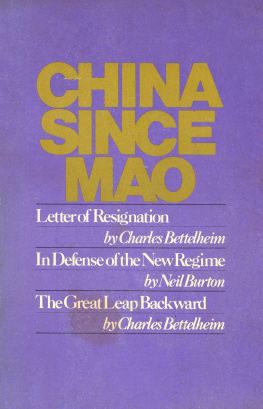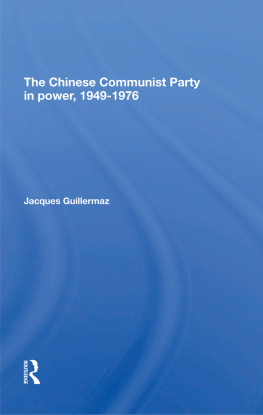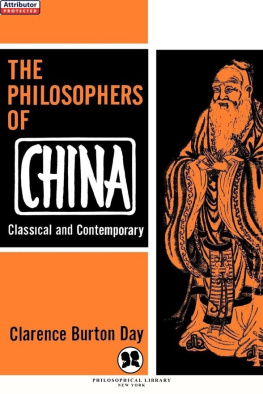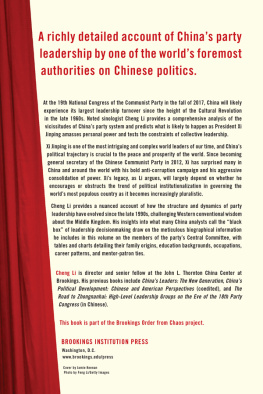China since Mao
Copyright 1978 by Monthly Review Press
All Rights Reserved
Library of Congress Cataloguing in Publication Data
Bettelheim, Charles
China since Mao
1. China Politics and government 1976
Addresses, essays, lectures. I. Burton, Neil G.,
joint author. II. Title.
DS779.26.B87 320.95105 7815623
ISBN 0853454744 cloth
ISBN 0853454752 paper
Monthly Review Press
62 West 14th Street, New York, N.Y. 10011
47 Red Lion Street, London WCIR 4PF
Manufactured in the United States of America
epub version 1.0
Letter of resignation to the FrancoChinese Friendship Association
by Charles Bettelheim
May 11, 1977
Dear Friends,
As you know, the events which have followed the death of Chairman Mao have deeply worried me. Like many other friends of China, I have felt serious apprehensions for the future of socialism in China since the arrest of the four leaders who played a central role in the course of the Cultural Revolution and who with the exception of Chiang Ching enjoyed the confidence of Mao Tse-tung.
The charge that the Four tried to carry out a coup dtat is in no way convincing. It is general practice for people who have successfully carried out a coup to claim that those they have deposed were trying to seize power by force.
My doubts with regard to the political consequences of these events are all the more serious since two of the arrested leaders, Yao Wen-yuan and Chang Chun-chiao, have made an important even though incomplete contribution to the analysis of the class basis of capitalist restoration in China.
However, whatever my worries and doubts, it seemed to me indispensable, before taking a position, to see what arguments were advanced by those who have taken over the leadership of the Chinese Communist Party, and what actual political line was going to be followed by them. What has transpired in the course of the more than six months which have gone by since the events of October 1976 unfortunately has only confirmed my fears.
The way in which the criticism of the Four has been and is being conducted has nothing in common with Chairman Maos teachings. There is no Marxist analysis to be found in the published material, simply slander and scandal, the low level indicating the inability of the present Chinese Communist Party leadership to develop any serious criticism of what the Fours political line might have been.
During the campaign conducted against the Four, one finds accusations which apply directly to the practices of the current leadership. One can read that the falsification of photos to which the Four resorted proves that they were at once both vile conspirators and opportunists wanting to seize the party and the state (Hsinhua dispatch; March 27/77). Condemning the falsification of photographs and every distortion of historical truth is certainly just; however, these practices presently predominate, as can be seen, for example, in the double issue of China Reconstructs of Nov.-Dec./1976, where falsified photographs appeared openly.
Other accusations made against the Four negate the very requirements of Marxism. Thus, for example, the reproach made against Chang Chun-chiao for having wanted to carry out a class analysis of present Chinese society and, furthermore, of having wanted to develop Marxism this is called a denial of scientific socialism and counter-revolutionary revisionism.
Other accusations are still more unbelievable or, if they were to be accepted, would raise serious questions as to the lifestyle of the leading cadres of the Communist Party such as the accusation laid against the Four of having meals served to them in restaurants without wanting to pay for them; of that addressed to Chiang Ching of having ordered an Empress dress.
Finally, other accusations amount to exaggerations which openly misrepresent the facts; they are gross falsifications. Thus, newspapers and magazines of the last few months have said that the Four lived a decadent and corrupt bourgeois life. Wang Hung-wen is said to be a typical representative of the new bourgeoisie. The Four are said to have obstinately upheld the positions of the landlords and the bourgeoisie, and to have been 100 percent committed to the capitalist road. They are presented as sworn enemies of the Communist Party, of the working class, of the whole people and the Chinese nation; as being guilty of espionage, of capitulating to foreigners, of importing instruments intended for the use of their secret agents, and of importing luxury articles. They are stated to have deliberately squandered state funds in order to damage socialist accumulation, and to have exalted material incentives. They are even presented as Kuomintang agents.
If such accusations correspond to reality, that could only cast the gravest doubts on the composition of the party leadership and on Maos own vigilance. If they were true, we might well expect some or all of the present leaders also to be revealed in due course as Kuomintang agents guilty of spying for the enemy.
But if, as I believe, the charges do not correspond to reality, it is impossible to trust leaders who deceive the people by eliminating those with whom they have disagreements, not by clearly explaining the basis of the disagreements, but rather by resort to slanderous attack.
Under these conditions, one is inevitably led to the conclusion that the fidelity to Mao Tse-tungs political line is simply a smokescreen designed to conceal a quite different line. In fact, an examination of texts published in China during the last few months, as well as what it is possible to establish as to actual practice, has led me to believe that a revisionist line is presently triumphing. The criticism of Teng has been abandoned, while calls giving production primacy over revolution predominate. Discipline and order are exalted, while there is no longer any question of the right of people to reserve their opinions, not to mention the right of people to rebel against a bourgeois policy. Questions as to the position of women during the socialist transition period are denied. The struggle against bourgeois right is scarcely mentioned anymore. The problem of the existence of the bourgeoisie within the party is juggled away. An appeal to class struggle is replaced by an appeal to struggle against the Four.
In an all-around way, the necessary criticism of the Four is conducted from a revisionist standpoint and not from a revolutionary one. No distinction is made between what they might have said or done wrong, and the points on which they might have been correct. More precisely, their mistakes are used in order to reject their correct analyses as well, in contradiction to the requirements of dialectical materialism, and in a way that reinforces bourgeois ideas.
What we know of what is going on in China confirms the revisionist orientation of the present policy. Factory regulations are becoming oppressive. Open-door schooling has practically been abandoned. This means that while paying lip-service to the Cultural Revolution, its gains are in the process of being liquidated.
As far as foreign policy is concerned, the struggle against the two superpowers has gradually been replaced by a struggle against social-imperialism alone. As a consequence, United States imperialism is denounced less and less. Its interventions, or those of its allies, in the life of other peoples, are frequently even seen as positive this was the case with the events in Zaire. But when two imperialist bandits are confronting one another, it is wrong to take the side of one against the other. The present international practices of the Chinese Communist Party damage Chinas prestige with people, especially in the Third World. In fact, these policies play into the hands of social imperialism.
Next page




